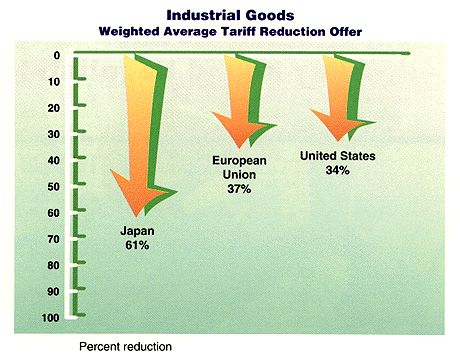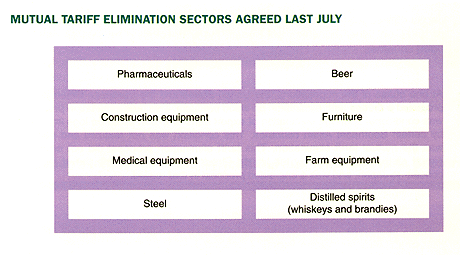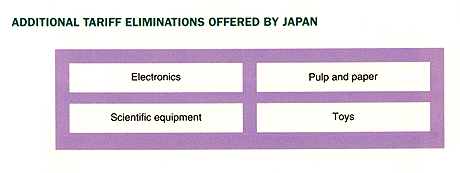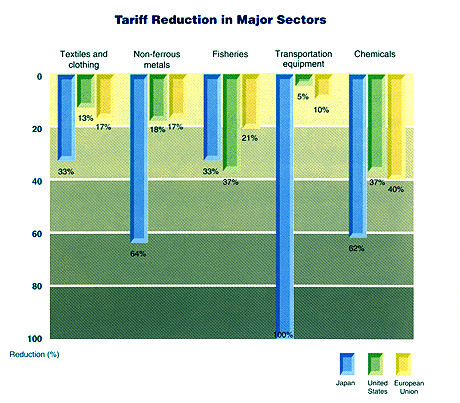Japan' s Contribution in the Uruguay Round Negotiations
MARKET ACCESS FOR GOODS
Japan' s Offer
Japan ' s offer on industrial and mining goods, including wood products, amounts to a weighted average tariff reduction of 61%. (Offers by the United States and the European Union are 34% and 37% reductions, respectively.)

In addition to the mutual tariff elimination ("zero for zero") in eight sectors and harmonization in one sector agreed to among the Quad (Japan, the United States, Canada and the European Union) last July, Japan took the initiative to extend similar measures to five other sectors and included these additional initiatives in its final offer. Unfortunately, two of Japan ' s major partners jointly decided not to participate fully in these initiatives. (These partners later agreed to the mutual tariff elimination in pulp and paper as well as toys.)




Japan offered a 51% reduction of tariffs on wood products and a one-third cut of tariffs on fisheries, which will benefit many developing as well as developed countries.
- At one phase of the negotiations, the United States and the European Union jointly proposed a mutual tariff elimination on wood products. This tariff elimination proposal was conditional upon the elimination of export bans or export taxes on logs imposed by certain Southeast Asian countries. This condition was not realized and neither was the mutual tariff elimination. This tariff elimination proposal did not address export restrictions on logs by the United States and Canada, which are of serious concern to Japan, and was a one-sided proposal in that regard.
Japan ' s tariff reduction compares favorably to that of the United States or the European Union in major sectors.

Other sectors where Japan has reduced tariffs by a large percentage:
- Machinery ............. 100%
- Aircraft and vehicles.. 100%
- Musical instruments ... 100%
- Rubber ................ 95.2%
Japan' s Initiatives in the Agricultural and Tropical Fruits Sectors
In the agricultural sector, despite extreme sensitivities in Japan, Prime Minister Morihiro Hosokawa made the difficult political decision to open the way for imports of substantial amounts of rice, as set forth in the Agreement on Agriculture. (1995: 379,000 tons; 2000: 758,000 tons)
Further, despite a very difficult domestic situation, Japan accepted tariffication of other agricultural products, such as wheat and dairy products. Japan ' s commitments on agricultural products are completely in conformity with the provisions of the Uruguay Round agreement (e.g., achieving an average 36% tariff cut), and are substantial in content.
Elimination of import restrictions:
- Wheat
- Barley
- Dairy products (e.g., butter and skimmed milk powder)
- Starch
- Dried leguminous vegetables
- Groundnuts
- Tubers of konnyaku
- Silk-worm cocoons
- Raw silk
On tropical fruits products, Japan made a substantial final offer. Japan also responded as much as possible to the interests of the developing countries in the agricultural negotiations. In addition, Japan intends to improve the Generalized System of Preferences (GSP) treatment for 12 tropical fruit items, such as fresh mangoes, prepared / preserved coconuts and hazelnuts.





